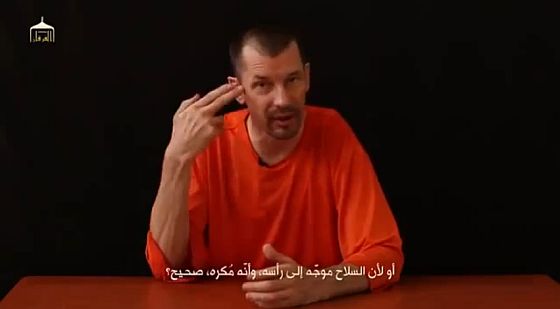
Like any organization that takes messaging seriously, ISIS has to study its audience while crafting its messages.
In its “second message to America,” the blunt warning from the militant group boiled down to this:
… just as your missiles continue to strike our people, our knife will continue to strike the necks of your people… We take this opportunity to warn those governments that enter this evil alliance of America against the Islamic State to back off and leave our people alone.
Beheading Americans — first James Foley and now Steven Sotloff — might seem like a counterproductive way of influencing American public opinion, but ISIS isn’t interested in gaining American sympathy. It just wants the U.S. to back off.
After several months in which it has enjoyed success after success during its often unopposed advance across Iraq, U.S. airstrikes have thrown an unwelcome obstacle in the progress of this would-be Islamic state.
ISIS’s victories have been its biggest recruiting asset and the promise of life in the new caliphate is much more appealing than the prospect of getting bombed by Americans.
ISIS had four American prisoners and now it has just two. Despite its flagrant disregard for the value of human life, there should be no doubt that ISIS applies a brutal but careful calculus in deciding when to sacrifice an American life, given that it has power over so few.
The killing of Foley and Sotloff seems much less like “an announcement of global jihad” than an indication that ISIS feels threatened.
No one inside or outside ISIS can have had any illusions that President Obama — his expressed determination to protect American lives notwithstanding — would base his decisions solely on the need to protect the lives of four American captives. For that reason, neither the death of Foley two weeks ago nor that of Sotloff now, could be expected to manipulate U.S. policy.
Even so, ISIS is surely well aware that America as a country has lost most of its appetite for war and “back off” is a demand that harmonizes with the anti-interventionist sentiment to which everyone in Washington is well attuned.
Even the most gung-ho hawks nowadays always feel obliged to qualify their war-making recommendations with an obligatory promise: no boots on the ground. The Pentagon and the American public collude with each other in sustaining the deceit that military action only becomes war after American soldiers start getting killed. Thus, no boots on the ground supposedly means no war.
Post 9/11, post the war in Iraq and as we approach the end of America’s longest war — the one in Afghanistan that is generally recognized as having accomplished nothing — Americans express less a sense of defeat than an easy resignation that “the problem” is really the nature of the Middle East. “The solution” thus appears patently obvious: have nothing to do with the region.
Yes, ISIS is a monster and we helped create it, but it doesn’t operate in the U.S. And even if we did try to defeat it, we’d more likely make the problem worse and turn the U.S. into a direct target for ISIS attacks.
For many Americans, there’s clearly something comforting in this perspective, but it leaves me wondering: what happened to everyone’s sense of humanity?
We each have many layers of identity, but doesn’t the sense of being human matter more than all the others? Or does being human matter less than being American?
Some commentators argue that the alarm calls about ISIS are being driven by Empire’s insatiable lust for war — suggesting that ISIS is in some sense a manufactured threat.
That’s a view that easily finds traction on the internet, but each time I hear this I have the same reaction: who would have the audacity to make this argument directly to this Yazidi girl?
Here is a child who has to carry a gun to defend herself and her family from ISIS because there is no one else she can rely on. She has been let down by humanity.
Perversely, we now inhabit a world in which the concept of humanity seems to have gradually fallen out of circulation even among people who would have once dubbed themselves humanists.
Supposedly, the only arbiter which can be applied to determine whether the threat posed by ISIS concerns Americans is ISIS’s ability or intention to kill Americans or harm American interests.
In an interview Obama gave in January he said:
[H]ow we think about terrorism has to be defined and specific enough that it doesn’t lead us to think that any horrible actions that take place around the world that are motivated in part by an extremist Islamic ideology is a direct threat to us or something that we have to wade into.
In other words, America should only concern itself with terrorism if and when it poses a threat to America.
It’s easy to understand what has led Obama to this conclusion — it’s part of his measured effort to wind down the war on terrorism.
Yet Obama lacks the political courage, moral conviction, or imagination to propose a new paradigm through which Americans can view the world.
The terrorism paradigm has become so entrenched in the American zeitgeist that this president has done little more than make minor modifications. Indeed, he had done so while expanding the national security state.
Ironically, the failure of the terrorism paradigm is becoming particularly evident in the debate about how the U.S. should respond to ISIS.
As war-weary Americans view the Middle East, it’s worth remembering what happened in South-East Asia after the U.S. withdrew from Vietnam. Within two years the Khmer Rouge in neighboring Cambodia had embarked on the worst genocide since the Holocaust.
Kenneth M. Quinn who later served as U.S. ambassador to Cambodia wrote:
[T]he explanation for the terror and violence that swept Cambodia during the 1970s is that a small group of alienated intellectuals, enraged by their perception of a totally corrupt society and imbued with a Maoist plan to create a pure socialist order in the shortest possible time, recruited extremely young, poor, and envious cadres, instructed them in harsh and brutal methods learned from Stalinist mentors, and used them to destroy physically the cultural underpinnings of the Khmer civilization and to impose a new society through purges, executions, and violence.
As the writer Sean Thomas has noted, the parallels between ISIS and the Khmer Rouge are striking.
In many ways Isis are the Khmer Rouge with prayer mats. Both wear, or wore, black, as if to emphasise their nihilism. Both expanded – even exploded – from stupid wars engendered by the West. Both ruthlessly murdered any rival factions, ensuring that they became the sole standard-bearer for fellow travellers.
The parallels go on. The Khmer Rouge used hallucinatory violence as a technique and leitmotif – ripping foetuses from living women, smashing babies against trees – as do Isis, beheading anyone they fancy and tweeting the result, burying women and kids alive. Just as Isis are fiercely, fundamentally religious – slaughtering the infidels, the heathens, the Christians, the Shia, or even tribes of Sunnis who don’t cut the jihadi mustard, so the Khmer Rouge were fiercely, fundamentally atheist – promising to tear down every temple, and throw every single monk into the sea. Which they did.
The two forces are likewise similar in their aims and accomplishments. The Khmer Rouge managed to kill 2 million Cambodians (a third of the nation’s population), Isis will aim to kill many more than that, and they may well succeed, if they manage to get hold of chemical weapons, dirty bombs, nukes, and/or the lost souls of lonely young men in London, Paris, Moscow, and Detroit. As the KR despised and feared anyone outside their core, Isis believe we – by which I mean everyone on the entire planet who does not submit to their ideals, or convert to their deviant form of Islam – are at once a threat and an abomination, worthy of nothing but death, or grotesque servitude.
There is plenty of evidence that ISIS has committed genocide, war crimes, ethnic cleansing and crimes against humanity — as has the Syrian government. These are crimes that should concern all humanity however far removed some of us might be from the carnage.
If we reassure ourselves that these horrors are occurring somewhere else but not here, we are in a methodical and dispassionate way allowing our own humanity to slowly dissipate. As we gradually become less humane we slowly succumb to a pervasive indifference. If we might once imagined we could feel safe by standing apart from the rest of the world, in the end we will feel nothing.



 Obviously, Kissinger’s purpose in making this claim is not to portray President Obama as a war criminal. After all, Obama often acts like one of Kissinger’s most devoted students.
Obviously, Kissinger’s purpose in making this claim is not to portray President Obama as a war criminal. After all, Obama often acts like one of Kissinger’s most devoted students.